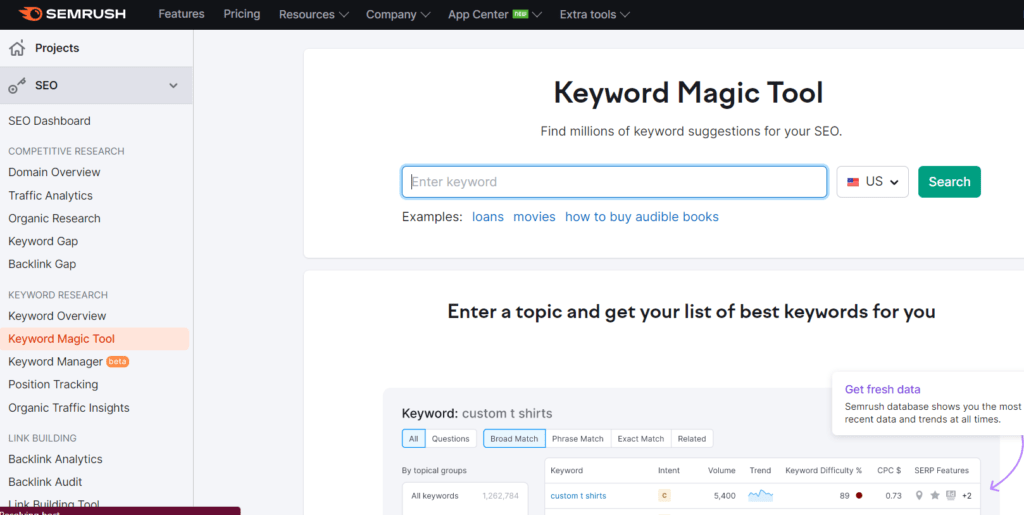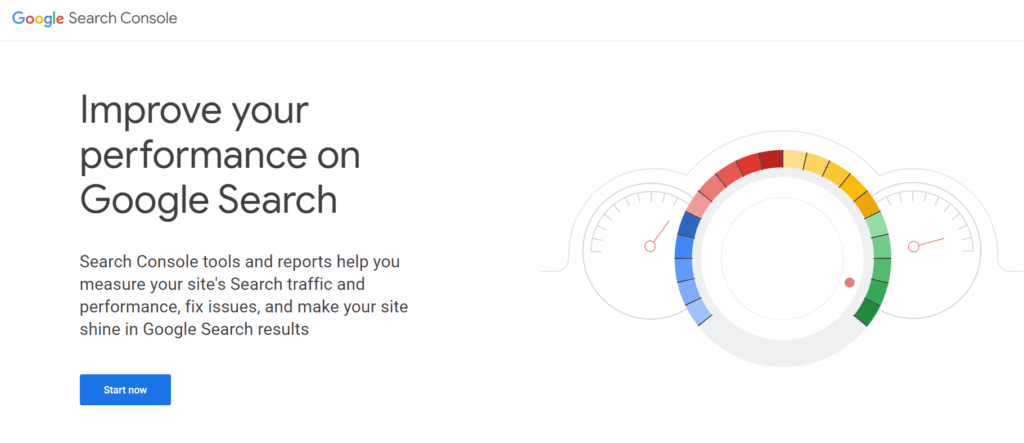Online sellers are always looking for ways to increase sales and profits. One of the best ways to do this is by optimizing their keyword research efforts. To succeed in today’s competitive online marketplace, sellers need access to reliable keyword research tools that will help them identify the best keywords to target for their business.
This article will provide an overview of some of the top free and paid keyword research tools and tips and best practices for optimizing your keyword research strategy.
Table of Contents
Key Takeaways
- Keyword research tools are essential for driving organic traffic to ecommerce websites, and both free and paid options are available.
- Paid keyword research tools like Ahrefs, Long Tail Pro, and Semrush offer more data and efficient workflows, but free tools like Google Keyword Planner and AnswerThePublic can still be effective for small business owners and entrepreneurs.
- The keyword research process involves finding good keyword ideas, checking ranking difficulty, and determining the best way to rank.
- Prioritizing keywords with the highest business potential can help ecommerce sellers focus their efforts and improve their SEO performance.
Google Keyword Planner
Google Keyword Planner is a great free tool for online sellers, offering keyword suggestions and metrics to help determine the difficulty score of each search query – giving you an edge over the competition. This powerful tool provides alternatives to popular keywords, tips for effective use, and comparisons to other free tools.
It can also identify common mistakes to avoid when using the planner and help you make better decisions based on how you interpret data. With its easy-to-read usability interface, Google Keyword Planner is a great starting point for any online seller looking to optimize their SEO strategy.

SEMrush
SEMrush‘s powerful keyword research features can help online sellers get the edge they need to stand out. It offers a comprehensive suite of tools for competitor analysis, keyword difficulty identification, backlink research, content optimization, and search engine rankings. Keyword Explorer is SEMrush’s tool that helps users generate related keywords and filter them by difficulty scores and search volumes.
It also provides detailed SERP analysis that lets you gain insights into your competitors’ top-performing pages and organic traffic sources. Content Optimization is another great feature of SEMrush which helps optimize existing content or create new content based on user-defined criteria such as target keywords, search volume, keyword difficulty score, etc. Through its Backlink Research tool, you can analyze any domain’s backlinks, including anchor text distribution and referring domains.

Moreover, SEMrush also allows users to track keyword rankings over time to track performance against competitors. With all these powerful features combined together in one place – SEMrush makes it easier for online sellers to identify profitable good keywords and build a successful SEO campaign.
Moz Keyword Explorer
Moz’s Keyword Explorer helps online businesses find low-competition long-tail keywords for higher SERP rankings, offering unique metrics like click potential and topical relevance score. It provides comprehensive keyword research tools such as competitor analysis, long tail keywords, keyword difficulty, backlink analysis, and seasonal trends.
The tool offers in-depth keyword tracking capabilities with competitive insights to stay ahead. Its advanced features include customizable search filters to target specific keywords and monitor changes over time. Additionally, its extensive database offers up to 700 million keyword suggestions from multiple sources worldwide for users to explore.
With Moz’s Keyword Explorer, users can analyze their website’s performance locally or globally and gain valuable insights into the SERP landscape with its powerful reporting feature. The intuitive interface makes it easy for beginners to start their SEO journey without prior experience or knowledge of SEO best practices.
Ahrefs Keyword Research Tool
Ahrefs’ Keyword Research Tool offers a comprehensive suite of features to help you maximize your SEO efforts and outrank the competition. With Ahrefs’ keyword research tool, you can gain insight into your competitor’s strategies and uncover new opportunities for targeting potential customers.
You can also find long-tail keywords tailored to your target audience and track search volume trends for each keyword so you know when it’s most effective to launch campaigns.
Additionally, Ahrefs’ keyword difficulty ranking feature allows you to determine which keywords will be easier to rank in organic search results. By utilizing Ahrefs’ suite of features, online sellers can benefit from improved visibility and increased website traffic.
KWFinder
Discover how KWFinder can help you optimize your content strategy and stay ahead of the competition with its intuitive keyword research tool. KWFinder is a great option for those looking to find long-tail keywords relevant to their business.
Its location-based search feature allows users to locate good keywords specific to their region easily. The competitive analysis tool also evaluates the current level of competition for any given keyword, allowing you to identify low-hanging fruit easier and faster. This comprehensive research tool provides data on search volume, helping you analyze which terms are most popular in your industry and target accordingly.
KWFinder also offers highly accurate estimates of keyword difficulty score that allow users to determine whether or not they should pursue a certain keyword based on how difficult it might be to rank for it in SERPs. The user interface is easy to navigate and understand, allowing even beginners to get up and running without hassle quickly. Furthermore, KWFinder’s Keyword Relevance feature helps you prioritize keywords based on their relevance to your business or website topic.
Whether you’re a beginner looking for an easy way into SEO or an experienced marketer seeking better results from paid campaigns, KWFinder’s extensive range of features makes it one of the best tools for improving organic traffic through effective keyword research. It offers highly detailed metrics that provide valuable insight into how competitive each term is and what chances you have at ranking higher in SERPs with them — essential information when crafting an effective SEO strategy.
Ubersuggest
This platform is far more than a basic keyword research tool. When you input a keyword into Ubersuggest, it provides a wealth of information, including keyword volume, seasonal trends, keyword difficulty, and cost per click. But it doesn’t stop there.
Ubersuggest also offers a detailed view of that keyword’s search engine result pages (SERPs), showing you the key players and their rank. Additionally, Ubersuggest has a unique content idea feature that provides you with a list of content pieces around the web related to your keyword, how many social shares each piece received, and the number of backlinks pointing to them. This can be particularly useful for online sellers wanting to build a content marketing strategy around their products.
SpyFu
SpyFu digs deep into the data to give you a comprehensive understanding of your competition. It starts by showing you every place your competitors show up on Google – every keyword they’ve bought on Google Ads, every organic rank, and every ad variation. You also get to see their ranking history, which can be a great tool for spotting trends and strategies that work. The Kombat feature in SpyFu allows you to compare your website with your competitors to see the most profitable keywords you’re missing.
AnswerThePublic
This tool focuses on the understanding that every product is the answer to a question. Providing a list of actual questions that people are asking about your keyword, it enables you to tailor your content to meet the needs of your potential customers directly. You can download visualizations and data in CSV format and see the latest trends around your topics. It can be invaluable for understanding customer intent and creating content that solves their problems.
Serpstat
This is a comprehensive platform that serves multiple SEO needs. Beyond providing information about search volume, competition, and keyword difficulty, Serpstat’s unique value proposition lies in its extensive suite of features, which includes rank tracking, backlink analysis, site audit, and competitor research. Its API allows for integrating its robust data into your applications, and its clustering and text analytics can provide a semantic analysis of your website content, enabling more focused optimization.
Long Tail Pro
Focusing on long-tail keywords, Long Tail Pro provides an in-depth look at keywords that may be less competitive but can drive targeted traffic. Each keyword offers a competitiveness score, search volume, and profitability score based on the average CPC and conversion rates. One of the standout features is its Rank Value, which estimates the monthly ranking value in the top position for that keyword. The tool also has a Rank Tracker feature, which enables you to track your ranking progress over time.
Keyword Surfer
Keyword Surfer is a handy, easy-to-use Google Chrome extension that enriches your Google search experience with immediate keyword data. When you type a keyword into Google, Keyword Surfer works in the background and presents crucial information on the sidebar of your search results page.
It gives you an estimated global and local monthly search volume for the queried keyword, which can be invaluable if your business targets specific geographical locations. Alongside these, Keyword Surfer provides a list of similar keywords, including their respective search volumes and similarity scores, offering a more expansive view of your keyword landscape.
It also presents correlation data like the number of exact keywords used in top-ranking pages, page speeds, and word counts, providing meaningful insights for your content creation and SEO strategies.
Keyword.io
Keyword.io is a comprehensive tool that stands out with its ability to provide extensive keyword suggestions from a single seed keyword. What sets Keyword.io apart is its platform-specific research. It allows you to research keywords for Google and platforms like YouTube, Amazon, and eBay.
If you’re an online seller or a content creator operating on these platforms, this feature can equip you with critical insights into platform-specific keywords and user search behavior. Keyword.io is also adept at generating long-tail keywords. These are often specific phrases that might not have large search volumes but are high in conversion potential, making them especially beneficial for niche markets.
Soovle
Soovle offers a unique approach by serving keyword data from multiple platforms simultaneously. You type in a keyword, and Soovle generates related search terms from Google, Bing, YouTube, Amazon, and more. This multi-platform perspective allows you to understand your potential customers’ search habits across the web. One of Soovle’s standout features is its customizability.
You can select the platforms from which you wish to see data, tailoring the tool to your specific operational platforms. Another beneficial feature is Soovle’s ability to save your keyword searches, providing a historical reference of your keyword research progress.
Benefits of Doing Good Keyword Research for Online Stores
While it might seem like a technical background process, the benefits of effective keyword research permeate all aspects of online selling. From improving search engine rankings and providing a competitive advantage to informing content creation and future strategies, keyword research can be the powerful tool that propels your online business toward growth and success.
Let’s delve into each of these benefits in more detail.
Improves Search Engine Rankings
The importance of search engine rankings for online sellers cannot be overstated. The higher your products appear in search results, the more likely potential customers will click through your product listings or eCommerce site. Keyword research helps you identify the keywords and phrases your potential customers use when searching for products you offer.
By strategically incorporating these keywords into your product titles, descriptions, meta tags, and even image alt text, you can improve your rankings on search engines, significantly increasing your online visibility. This visibility is critical in driving organic traffic to your site, which, unlike paid traffic, doesn’t diminish over time or add to your advertising costs.
Targets the Right Audience
Keyword research gives online sellers better understanding of their audience’s language – the exact terms and phrases they use when searching for products. This understanding allows you to align your product listings and descriptions with your potential customers’ search behavior. The result is more targeted visibility—you’re attracting more and more relevant traffic. These people are actively interested in your products, leading to higher engagement and conversion rates.
Competitive Advantage
The digital marketplace is vast and highly competitive. It can be challenging for online sellers to stand out, especially when competing with larger, more established businesses. One way to carve out a niche is by identifying and targeting long-tail keywords. These are specific, often less competitive, keyword phrases that your competitors may not be targeting.
While these keywords may have lower search volumes, they often signify a strong intent to purchase and can lead to higher conversion rates. Leveraging these long-tail keywords can give you a competitive advantage and help your products stand out in search results.
Assists in Content Creation
For online sellers, crafting compelling content is about more than just product descriptions. It also includes creating engaging blogs, compelling product reviews, informative FAQs, and social media posts. Keyword research can provide a treasure trove of content ideas. For instance, keyword research may reveal that your potential customers often search for “how to use [your product]” or “[your product] vs. [competitor’s product].” These insights can inspire blog posts or video content, providing valuable information to your customers and improving your SEO.
Understanding Search Intent
Keywords are not just about the words people use when searching but also about why they use them. This “why” is known as search intent and can be categorized into informational (wanting to know), navigational (wanting to go), transactional (wanting to buy), and commercial investigation (wanting to compare).
Understanding the intent behind search queries can help online sellers tailor their content and product offerings. For example, if many of your keywords have a transactional intent (“buy organic skincare products”), your product descriptions should be persuasive, highlighting the benefits of your products.
Provides Valuable Analytics
Keyword research tools often provide data on search volume and competition for specific keywords. These metrics can offer insights into market demand and the level of competition for different products. For instance, a high search volume combined with low competition may indicate a lucrative gap in the market. Additionally, keyword research can reveal seasonal trends (like a spike in searches for “swimwear” during the summer), enabling you to adjust your inventory and marketing efforts accordingly.
Inform Future Strategies
By continually monitoring and analyzing keyword trends, online sellers can anticipate consumer behavior and market trends shifts. Maybe you notice a growing interest in a particular product category or an increasing emphasis on sustainable practices. These insights can inform your future strategies, whether expanding your product line or highlighting your brand’s commitment to sustainability. Staying ahead of these trends can give you a significant advantage.
Business Growth
The above benefits contribute to one primary end goal: business growth. By implementing effective keyword research, online sellers can increase their online visibility, attract more relevant traffic, understand their audience better, create more valuable content, stay ahead of market trends, and drive more sales. This increased revenue can enable you to invest more in your business, whether expanding your product line, improving your website, or hiring more staff.

Is it necessary to use paid keyword research tool?
The necessity of using a paid keyword research tool often depends on the specific needs of your business. Both free and paid keyword research tools can provide valuable data and help you create an effective SEO strategy. However, some differences might benefit a paid tool in certain situations.
Here are some things to consider:
The volume of Keywords: Free keyword research tools often provide limited keyword suggestions or search queries daily. A paid tool with unlimited keyword suggestions might be more suitable if you run a larger operation or manage multiple websites.
Depth of Data: Paid tools often provide more comprehensive data, including historical data trends, keyword difficulty scores, click-through rates, and more. This additional data can provide a more in-depth understanding of your keywords and help you craft a more nuanced SEO strategy.
Competitive Analysis: Many paid tools include features that allow you to analyze your competitors’ keyword strategies. This can be beneficial in competitive industries and can help you identify gaps or opportunities in your strategy.
Additional Features: Paid tools often include rank tracking, website audits, backlink analysis, and more. These features can be extremely useful in improving and monitoring your overall SEO performance.
Free keyword research tools can often suffice for smaller businesses, startups, or individual bloggers. They can provide a solid foundation of keyword data and help improve search engine rankings without additional cost.
Starting with a free tool can be a good way to familiarize yourself with keyword research. As your business grows, you might find that investing in a paid tool is a worthwhile decision to scale your SEO efforts.
What is Keyword Difficulty?
Keyword difficulty (KD) is critical when strategizing for search engine optimization (SEO). It refers to how challenging it would be to rank on the first page of search engine results for a specific keyword. The calculation for keyword difficulty often considers factors such as the number of websites already ranking for the keyword, the authority of those websites, the number of backlinks to those sites, and the on-page SEO strength.
Here’s why keyword difficulty matters:
1. Competition Analysis: High keyword difficulty usually indicates high competition. A keyword with a high difficulty score means many authoritative sites already rank for it. Attempting to rank for such keywords without a robust SEO strategy and high domain authority can be tough.
2. Resource Allocation: SEO is a long-term process that requires consistent effort and resources. Knowing a keyword’s difficulty helps you decide whether the potential return on investment (ROI) is worth the resources required to rank for it. If a keyword has high difficulty, you might need to invest more time, create high-quality content, and build high-authority backlinks to have a chance at ranking for it.
3. Strategy Development: Understanding keyword difficulty helps shape your SEO strategy. For new websites or those with low domain authority, it can be beneficial to target low-difficulty keywords initially. While these keywords might have lower search volumes, they can also have lower competition, making ranking them easier. You can gradually target more competitive keywords as your website grows and gains authority.
4. User Intent Understanding: Keyword difficulty alone doesn’t provide a complete picture; it needs to be considered along with search volume and user intent. A keyword might have low difficulty, but if it doesn’t align with your audience’s intent or has very low search volume, ranking for it might not provide significant benefits.
Keyword difficulty is a vital metric. However, it’s important to balance it with other factors, such as search volume, user intent, and the relevancy of the keyword to your content or business.
Don’t Underestimate the Power of Google Search Console!
Google Search Console (GSC) plays a significant role in keyword research, offering unique insights because its data comes directly from Google’s search results. Here’s why GSC is important for keyword research:
1. Discovering Organic Keywords: GSC’s Performance report shows you the keywords (also called “queries”) that users have typed into Google to find your website. You can see how many clicks and impressions your site has received for each keyword, its average click-through rate (CTR), and its average position in the search results. This data is essential for understanding which keywords your site performs well for and which might need more work.
2. Identifying Opportunities: You may find keywords where your website receives impressions but not many clicks. This could mean that you’re ranking reasonably well for these keywords, but your title tag and meta description (the elements that make up your search listing) may not be compelling enough to attract clicks. Alternatively, it could indicate that while Google finds your page somewhat relevant to the keyword, the content might need to be improved to rank higher and earn more clicks.
3. Understanding Trends Over Time: Google Search Console allows you to compare keyword performance over different periods. This feature can help you understand if changes to your website or wider trends in user behavior (seasonal trends, for example) are impacting your keyword performance.
4. Improving Content: The data in GSC can help you improve existing content and generate ideas for new content. For example, if you notice a keyword bringing traffic to your site but the current content on your page doesn’t fully address it, you could update the content to answer the query better.
5. Local SEO: If your business operates in specific countries or regions, GSC can show you how well you’re performing for keywords in those areas. This can guide you in tailoring your content and SEO strategy to different locales.
While Google Search Console might not be the first tool that comes to mind when you think of keyword research (compared to tools like SEMrush or Ahrefs, specifically designed for this purpose), it offers valuable insights that complement those tools. Combining the data from GSC with other keyword research tools, you can develop a comprehensive understanding of your keyword performance and opportunities.

Keyword Generator Tools vs. Keyword Research Tools
While there is some overlap in the functions of keyword generators and keyword research tools, they are used for slightly different purposes. Keyword generator tools are great for brainstorming and getting a broad spectrum of keyword ideas, while keyword research tools provide the data to decide which keywords to target. Ideally, an effective SEO strategy would utilize both types of tools.
Keyword Generator Tools
Keyword generator tools are primarily designed to produce numerous keywords around a seed keyword. For example, you might input “organic coffee” into a keyword generator tool like Keyword Sheeter. The tool would then generate a long list of related keywords like “best organic coffee,” “organic coffee benefits,” “where to buy organic coffee,” and so on. This is an ideal starting point when you’re in the brainstorming phase of your keyword strategy, particularly when trying to come up with a broad set of ideas.
However, while these keywords may be related to your seed keyword, Keyword Sheeter, and similar tools usually won’t provide further data about these keywords, such as search volume or competition level. You’d need a keyword research tool for that.
Keyword Research Tools
Keyword research tools provide detailed insights into each keyword. For instance, a tool like SEMrush suggests keywords related to your seed keyword and provides crucial information about those keywords. If you input “organic coffee” into SEMrush, you’d get a list of keywords, their monthly search volumes, keyword difficulty scores, cost-per-click (CPC) for PPC campaigns, and more.
For example, you might find that the keyword “best organic coffee” has a high search volume and a high keyword difficulty score, suggesting that many websites compete to rank for that keyword. On the other hand, a long-tail keyword like “organic coffee benefits for health” might have a lower search volume but also a lower difficulty score, indicating that it might be easier to rank for.
Moreover, SEMrush and similar tools can provide a SERP analysis for your keywords, showing the top websites currently ranking for them. They can also track the positions of your keywords in the search results over time and show which keywords your competitors are ranking for.
In essence, while keyword generator tools like Keyword Sheeter can help you come up with a vast array of potential keywords, you would need a keyword research tool like SEMrush to decide which of those keywords are worth targeting based on various factors like search volume, competition, relevancy, and user intent. Combining the power of both types of tools can yield a comprehensive and effective keyword strategy.
Conclusion
Keyword research is a crucial tool in the arsenal of online sellers. It’s not just about finding the right words to use; it’s about understanding your audience, standing out in a crowded marketplace, anticipating market trends, and driving business growth. By understanding and effectively implementing keyword research, online sellers are poised to succeed in the competitive world of online commerce.
Using any keyword research tool effectively requires understanding how it works, being aware of potential pitfalls like seasonal trends affecting data accuracy, regularly retargeting old keywords, and going after new ones to ensure maximum success for your website or blog. Keeping all this in mind can help online sellers stay ahead of their competitors while improving their organic SERP ranking.
Frequently Asked Questions
How can keyword research optimize a website’s SEO?
We believe keyword research is a must for optimizing website SEO. It helps to identify relevant keywords and phrases that can increase search engine visibility and long-tail keywords with lower competition. Keyword density plays an important role in content marketing, so using the right keywords without overusing them is important.
Additionally, incorporating these keywords into your content will help you rank higher in organic search results. Search Engine Optimization involves more than just finding the right words; it also requires understanding the competition and leveraging other techniques, such as link building. Therefore, investing in quality keyword research tools can be beneficial to maximize SEO performance.
How do competitors influence keyword research?
As online sellers, it is important to understand how our competitors influence keyword research. Competitor market analysis can help us identify which keywords are most profitable and what type of content we should create to capture search engine visibility.
By analyzing the keyword selection criteria of our competitors, we can gain insight into their targeted ad campaigns and use this data to inform our own. In addition, researching competitor content can give us an idea of what topics are currently trending in the market and allow us to create research-driven content that will be seen by more potential customers.
What is the difference between free and paid keyword research tools?
Regarding keyword research, free and paid tools have their respective advantages. Free tools are great for getting a basic idea of the keywords your business should focus on, finding long-tail keywords, and targeting niche markets.
Paid tools provide more accurate data and automated keyword research processes that can save time in the long run. With this in mind, paying for accuracy may be worth it if you’re serious about SEO success. In addition, many paid tools offer data analysis tools to help you better understand how your competitors use keywords to succeed.
How can keyword research be used to identify trending topics?
We can use keyword research to identify trending topics by looking at the search volume of certain keywords, analyzing competitor strategies and pricing comparisons, and using SEO optimization techniques. The imagery of a crowded market with shoppers searching for their desired product can be used to depict the complexity of keyword research.
With in-depth research skills and an ability to distill complex topics into concise descriptions, we can generate trends to help us understand what interests people and how best to target them. We can create effective traffic strategies for our online store through careful analysis of data gathered from various sources.
How can keyword research help increase website traffic?
We believe keyword research is essential for increasing website traffic. Businesses can increase their search engine and website visibility by researching and selecting the right keywords. Developing a strong keyword strategy and optimizing those keywords for your website will help draw more potential customers, resulting in more sales.
To maximize success, selecting relevant keywords with high search volumes is important, as analyzing competitor websites to find new opportunities and using tools like Google Keyword Planner or Moz Keyword Difficulty Tool to assess difficulty scores. When done correctly, you can create powerful keyword strategies to take your business’s online presence and website traffic to the next level.
Conclusion
We’ve discussed various keyword research tools that can help online sellers find the best keywords to target for their business. Whether you choose a free or paid tool, it’s important to research and select the one that best fits your needs. One interesting statistic is that up to 70% of searches on Google are comprised of long-tail keywords, so it’s important to prioritize those when choosing keywords for your business. With these tips in mind, online sellers should be able to optimize their keyword research efforts and achieve greater success with their online businesses.







